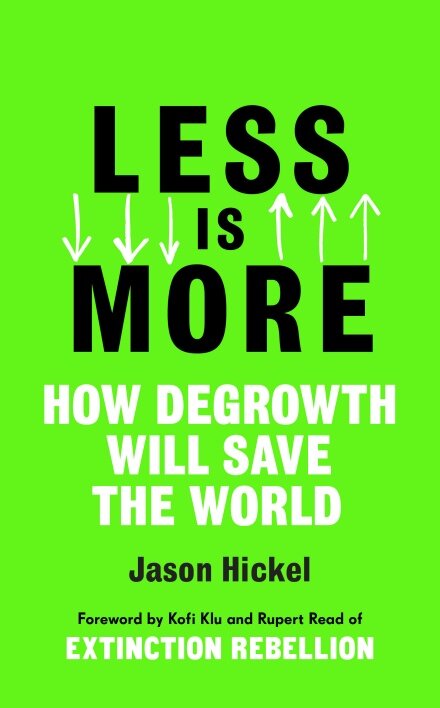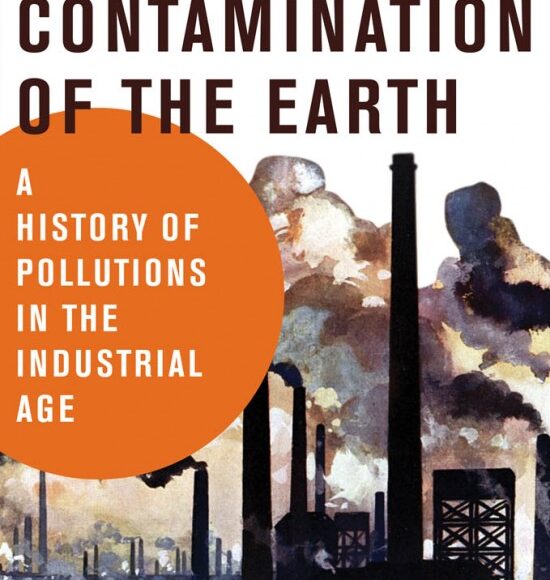The Contamination of the Earth: A History of Pollutions in the Industrial Age, by François Jarrige and Thomas Le Roux, MIT Press.
Less is More: How Degrowth Will Save the World, by Jason Hickel, Penguin Random House.
There are certain images that can mark a young mind forever. I can still vividly recall finding a black and white photo in a school history textbook featuring several participants in the 1888 matchgirls’ strike. The young women show early symptoms of necrosis of the jaw: the notorious occupational disease caused by exposure to phosphorous, which essentially eats away at the human face, resulting in excruciating pain and irreversible deformity.
Those defiant faces (in a textbook largely designed to encourage us to memorise the dates of the Reform Acts) still level a terrible accusation against capitalism. As I recall, the tale was supposed to be read as a milestone in the emergence of mass-democracy. To me, on a far more intuitive level, it exposed the barbarism of a force that remains content to mangle human bodies in order to render the disposable profitable.
We should of course be moved and inspired by such struggles, but perhaps we might also consider why there was a need to argue for non-face rotting working conditions in the first place. Indeed, the captains of British industry had form on this front. Jason Hickel’s Less is More: How Degrowth Will Save the World, references the work of public health historian Simon Szreter, whose research has found that declines in life expectancy during the Industrial Revolution had only previously been matched by the Black Death. In the middle of another global pandemic, it feels uncomfortably relevant to observe today’s liberal centre incorporate the horrors of early industrialism as little more than regrettable growing pains.
The banning of phosphorus features in The Contamination of the Earth: A History of Pollutions in the Industrial Age, by historians François Jarrige and Thomas Le Roux. However, the authors are careful to set such advances towards basic occupational health in context: specifically, a hypermasculine ethos in which bosses, doctors, and indeed many workers, saw such ‘professional poisons’ as inevitable.
In an age of mass extinction, it should not be considered radical to observe that capitalism kills. We must be wary of the urge to historicise the appalling wastage of the nineteenth century, and place it in a more barbaric past. With the very tangible threat of omnicide on the horizon, the neatness of a school textbook adds up to complacency.
Both of these books offer accounts of destructive forces that are at once obvious and obscure. There is a dilemma for anti-capitalists here: telling people that widespread suffering wasn’t necessary pushes against the sacred ideal of progress. What if all the trauma involved in the getting of riches simply isn’t worth it?
In their meticulous study, Jarrige and Le Roux identify the long process through which pollution became integral to narratives of progress. Early modern pre-capitalist governance, in contrast, had the good sense to exile the dirtiest tanneries and forges beyond the city limits; to re-use urban waste rather than trying to dump it; to steward waterways and fish stocks. But the corporate lobbyist has a longer pedigree than we might think. Looked at from this starting point, our era of climate chaos was not inevitable, nor was it simply the by-product of thrusting market forces. It was legislated for and propagated, it proceeded consciously through political and scientific bodies with a clear modus operandi. With nature rendered as an infinitely reproducible commodity, industrialist ideology could proceed with the credo that ‘industry is a form of worship.’
We should be alarmed to note that such ideological zeal – pollution as progress – remains with us. Just as the smokestacks of the industrial metropolis were once viewed as infinitely healthier than the old artisan’s workshops, and white lead became a symbol of spotless hygiene, so today we believe, falsely, that the sheen of digital innovation will result in cleanliness. Coltan mines in the Congo, and cancerous rare earth excavations in China – so vital to the ongoing boom in consumer electronics – tell a different story. Each fresh phase of capitalist production always presents itself as the inverse of a dirtier past, but really it just becomes better at hiding the enormity of waste that it produces.
As the authors conclude, networks of extraction and dumping continue to outstrip previous centuries. However, the new political ecology of globalisation makes us blind to this:
‘In cities in the North that are heavy consumers of goods and services, infrastructures are sufficiently developed to evacuate waste and provide a degree of urban hygiene, which leaves the impression of a world without pollution, even though consumption is based on a productive chain (including mines, transport, and industry) that causes many contaminations.’
Well into the nineteenth century, pollution was understood primarily in terms of its unavoidable sensory cues: before technical advances began to standardise measurements of air quality and water purity. The question of how our relationship to pollutants became abstracted requires more than an academic text to explore. In the immigrant hungry Ruhr, where washing famously turned black due to the intensity of its industrial output: this was taken as a fact of life. In contrast, peasants across Europe often rioted when toxic emissions destroyed their crops. Then and now, deracinated and precarious migrant labour, like coal, is a primary input that feeds the factory system. Indeed, as Andreas Malm has demonstrated, the two go hand in hand.
The Contamination of the Earth provides a comprehensive account of how pollution is fundamentally linked to power and global inequalities. Out of this picture of radically different material conditions universal responses seem elusive. Air pollution is becoming increasingly intolerable in London, something that a recent landmark legal ruling has acknowledged. The lungs of millions of Londoners may be cleaner as a result. Meanwhile, the millions of residents of Kinshasa, capital of the Congo, have to contend with life in a city that has no mains sewage system. The nightmare of the nineteenth century slum-city is still integral to the reality we have built: the poorest continue to work the hardest and pay the most.

Over the past year, anti-capitalism has veered into the mainstream. The former Governor of the Bank of England Mark Carney, offered a disconcertingly radical example of this new scepticism by contrasting the exponential growth of Amazon.com, while: ‘the value of the vast region of the Amazon appears on no ledger until it’s stripped of its foliage and converted into farmland.’
Such arguments seem less remarkable when we consider polling which shows that a majority of Britons view capitalism as unfair. What’s more worthy of note is the way in which such sentiment is still largely exiled from the domain of electoral politics itself. In the anglophone world at least, it remains taboo to question the primacy of free exchange from anywhere near the centre ground. The social democratic platforms of Sanders and Corbyn, meanwhile, have been shorn of their insurgent energy. While the left that these men cleaved to in their younger years struck out for a long march through the institutions, unfolding ecological collapse demands a speedier advance.
Less is More posits that this collapse has intellectual origins. GDP – the notoriously flawed metric that was adopted in the middle of the last century – is particularly significant. Hickel also suggests that Cartesian dualism and colonialism have fed ideologies of dominant disciplines like economics, which subordinate environmental destruction as ‘externalities’ and validate the thirst for cheap natural inputs. Such deep rooted enlightenment ideas have brought us to an impasse: racing towards the precipice of planetary limits, while trying to stop the juggernaut of exponential growth and consumption.
This book was penned just before the pandemic. As a year elapses which featured a macabre dance whereby retail therapy and eating out were weighed up against human life, the reckless imperatives of growthism are presumably now far more visible. Exponential growth too, has presumably been the topic of widespread critical thought. Everything, potentially, happens on an incomprehensible scale. More potently: wages for social reproduction have become sensible, rather than radical.
Hickel, an anthropologist writing for a general audience, succeeds in outlining a fresh history of the epic struggle between capital and the commons. It’s a good story, but one that reads a little too much like a textbook. At points, Less is More is awkwardly didactic: it leaves us without a mechanism to leap from the past to the future.
A foreword by Extinction Rebellion, and a creditable argument linking the politics of degrowth to de-colonisation, imply a revolutionary moment must come, and soon. The core policies presented are ripe for the uptake – ending planned obsolescence, shortening the working week, capping resource use, reducing inequality, and expanding public goods. This adds up to a theory of ‘radical abundance’ that would indeed represent a revolutionary post-capitalist settlement.
However, for a book with ‘how’ in its title, the means by which we might get there are explored in less detail. Hickel stops short of following the intellectual father of de-colonisation and declaring that a new era of freedom should be achieved by any means necessary. If there is a tacit assumption here that the rich and their allies will simply accede to the demands of a new politics wired up to the logic of growth’s obsolescence, this is surely the political equivalent of believing in the chimeras of green growth or geoengineering. If we do develop a new post-capitalist system that protects and respects the rights of all bodies and ecosystems, it will involve an immense struggle against the dominance of those who see them as cheap and infinitely disposable.
*
Capitalism accuses itself, simply when it is made visible: on the body, in the air, above all, in the darker recesses of the human mind. Here we reach a crucial question. Just as early modern burghers had an intuitive sense that pollution should be pushed outside the city walls, do we retain, within us, some kind of sense that most of our ancestors were robbed: their land enclosed, their family cleared out, their skills and status demeaned and coerced?
Much will come to depend on whether a kind of intergenerational trauma can wake up the global north from its consumption-induced fug. The success of Green New Deals and Just Transitions might all come down to one deep-set issue: have we become so alienated as to forget the sanctity of things held in common?
2021 will be the year when we find out.
